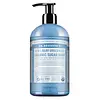What's inside
What's inside
 Key Ingredients
Key Ingredients

 Benefits
Benefits

 Concerns
Concerns

 Ingredients Side-by-side
Ingredients Side-by-side

Water
Skin ConditioningSodium Cocoyl Methyl Isethionate
Cocamidopropyl Betaine
Cleansing5-Bromo-5-Nitro-1,3-Dioxane
PreservativePEG-10 Sorbitan Laurate
EmulsifyingGlycerin
HumectantPotassium Sorbate
PreservativeSodium Benzoate
MaskingCitric Acid
BufferingSodium Sulfite
PreservativeAloe Barbadensis Extract
Skin ConditioningParfum
MaskingSodium Hydroxide
BufferingTetrasodium EDTA
Ethyl Glutamate
Skin ConditioningMethyl Glucose Caprate/Caprylate/Oleate
EmollientPropanediol
SolventSodium Citrate
BufferingWater, Sodium Cocoyl Methyl Isethionate, Cocamidopropyl Betaine, 5-Bromo-5-Nitro-1,3-Dioxane, PEG-10 Sorbitan Laurate, Glycerin, Potassium Sorbate, Sodium Benzoate, Citric Acid, Sodium Sulfite, Aloe Barbadensis Extract, Parfum, Sodium Hydroxide, Tetrasodium EDTA, Ethyl Glutamate, Methyl Glucose Caprate/Caprylate/Oleate, Propanediol, Sodium Citrate
Ingredients Explained
These ingredients are found in both products.
Ingredients higher up in an ingredient list are typically present in a larger amount.
Citric Acid is an alpha hydroxy acid (AHA) naturally found in citrus fruits like oranges, lemons, and limes.
Like other AHAs, citric acid can exfoliate skin by breaking down the bonds that hold dead skin cells together. This helps reveal smoother and brighter skin underneath.
However, this exfoliating effect only happens at high concentrations (20%) which can be hard to find in cosmetic products.
Due to this, citric acid is usually included in small amounts as a pH adjuster. This helps keep products slightly more acidic and compatible with skin's natural pH.
In skincare formulas, citric acid can:
While it can provide some skin benefits, research shows lactic acid and glycolic acid are generally more effective and less irritating exfoliants.
Most citric acid used in skincare today is made by fermenting sugars (usually from molasses). This synthetic version is identical to the natural citrus form but easier to stabilize and use in formulations.
Read more about some other popular AHA's here:
Learn more about Citric Acid